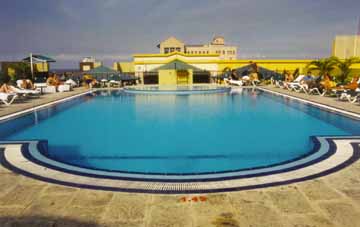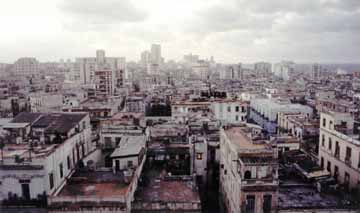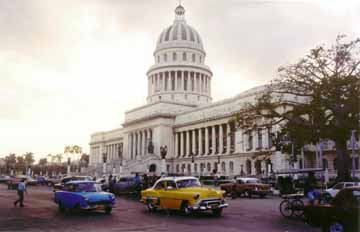Forbidden Sister City Ending the Cuban Embargo Could be a Boon for the Southeastern Economy By Glynn Wilson and Spider Martin HAVANA, Cuba — The view from atop the Golden Tulip Parque Central Hotel tells the tale of this Forbidden City, a scene witnessed first-hand in December by Mobile Mayor Mike Dow and a contingent from the University of Alabama.
After 40 years of Socialist dictatorship and government ownership, this once grand world class city visibly crumbles in on itself. It has been compared to East Berlin after the collapse of the Berlin Wall, and it is clearly the wounded heart of a country that should be a Mecca due to its special place on the planet, happened upon by Christopher Columbus and crew in 1492. To a capitalist developer, however, or a democratic political opportunist, this sad scene represents an obvious opportunity. On a globe with few new frontiers left to discover and tame, Cuba could be the setting for the next gold rush for Alabama, the South and the U.S. economy — once the political will is found to tear down the wall formed by the travel ban and economic embargo.
Will Alabama help lead the way to bring perestroika (restructuring), demokratizatsiya (democratization) and glasnost (openness) to one of the last Communist regimes? Mayor Dow says yes, although he's not without his critics in Mobile. "I don't believe embargoes are effective when it comes to altering political ideologies," Dow says. He talks about the case in the 1970s when then-President Jimmy Carter imposed an embargo on shipments of wheat to Russia as punishment for its invasion of Afghanistan. Russia bought the same amount of wheat from the Canadians, and nothing changed. "The only people who lost were the American farmers. It didn't change the ideology of Russia one iota," he said. He is aligned with the official position of the U.S. Chamber of Commerce, which advocates lifting the embargo and establishing trade as "a more effective way of bringing about change." The Mobile Chamber of Commerce is working for the City of Mobile to foster a partnership in preparation for when that day comes. Mobile and Havana became sister cities in 1993. The state and city are "uniquely located," he said, to benefit from renewed trade.
As a foretaste of what the future may serve up, the U.S. House last year authorized the first shipments of goods to Cuba since 1963 to help in the food shortage caused by the winds and floods of Hurricane Michelle. Valued at about $50 million, Dow said the shipments of corn and chicken are prime examples of the types of products Americans could be selling to Cuba, much of it delivered by trains and trucks from Birmingham, Atlanta and other points north, or down the Tennessee-Tombigbee waterway, through the Port of Mobile. According to estimates put together in a study for the Alabama International Trade Center with data from the International Trade Commission, lifting the sanctions on trade with Cuba could result in U.S. exports valued at $658 million to potentially $1 billion a year, 17 percent to 27 percent of Cuba's total imports. This would include about $150 million a year in wood products for Cuba's crumbling highways, railways, airports, ports and harbors, housing and other infrastructure for the expected increase in tourism. Trading with the U.S. would also help the Cuban people buy even more food for the same money, and they could sell their goods back to us, mainly coffee, sugar and cigars. They now must import meat, grain and medicine from across the world, from as far away as Vietnam and Indonesia, since they were cut off from the Russian aide teat after the break up of the Soviet Union in 1988-89.
The scene on the Malecon, a four-mile long concrete wall holding the Gulf of Mexico at bay on the north shore of Havana, also tells a tale in this Forbidden City. It is a symbolic place, often referred to as Cuba's "Berlin Wall," and it holds a special place in the literature of Graham Greene, Gabriel García Márquez and of course Ernest Hemingway. Late into the night, local youth hang out drinking rum and playing salsa music on acoustic guitars, flirting with the young girls who make their clandestine living here, a living from love. The chicas never seem to sleep, and can't resist an American tourist. "Do you like me?" they say, looking up at you with those deep brown eyes the color of coffee beans. "Want to party with us?" On the Malecon, they will play guitar and sing to you for dollars, whether you want them to or not. They will urge you to buy Cuban cigars, even draw your caricature for a one dollar bill. "No gracias," one must answer, over and over, or more accurately, "no graci." Due to Creole and African influences, with a little Italian thrown in, locals say it so it sounds like "no gra-ci." Everything is shortened from the original Spanish. Buenos noches, good evening, sounds like "bueno noche." They also say ciao (chow) for goodbye, not adios like they do in Mexico, which means "to god." Remember, this is largely an atheist country, although they now celebrate Christmas due to the pope's visit a few years ago. The Cuban people are now embracing the Catholic Church, although it seems almost everyone works two jobs — one for the government and another on the black market. They are desperate to survive in an economy run on U.S. dollars, where the government pays in pesos. School teachers make between 196 and 224 pesos a month, the equivalent of $7 or $8 a month. Along the Malecon in an outdoor cafe, you can drop $7 on three cups of coffee with Cuban sugar and milk, cafe con leche, thank you very much. Or should one say "mucho graci?" It is possible to find a cheap lunch in Havana. But it's not easy, and the salad is always the same. Thinly sliced tomatoes and cucumbers on chopped cabbage and onions, no dressing. We saw no lettuce, no eggs. Apparently Hurricane Michelle blew away all the chicken houses, though a few roosters pecked around in the grass by the historic Hotel Nacional. Perhaps escapees? Or religious icons, awaiting the voodoo mambo? Unlike the people of New Orleans and other American and European cities, the people of Cuba do not spend much time thinking about food, perhaps because it would do them no good. The food is just not there. On the other hand, it is hard to find an obese person in Cuba. In addition to the possibilities for direct trade with Cuba for food stuff, there are opportunities to redevelop Havana when the embargo wall comes down, Mayor Dow says. "Havana is a magnificent city. The architecture there is really off the charts," he said. "Preserving those buildings and rebuilding Havana is going to be a huge job. Once the embargo's lifted, if people have an opportunity to engage in that renovation in a way that would protect their investment, you will see a lot of money moving into Cuba."
The scene at Club Palermo, a famous Salsa club three blocks from the Capitolo, also tells this city's tale. To get in without having to pay a cover charge you need a jinetero, a local guide, invariably a male between the ages of 18 and 25. Jinetero in Spanish means, roughly, horse rider. But it does not refer to the jockey so much as the one who holds the horse's reins. It has officially been defined by the people of Mexico as "people who earn money in illegal or opportunistic ways." Sound familiar? A jinetero can get you anything on the black market from chicas to cigars to drugs, although they must pay the policia on the corner $5 to keep their ID and operate on the streets. The government posts a cop on every other corner, literally. They watch everything. But they are very friendly to visitors, especially Americanos, even forgiving touristos drinking beer openly in the street. Locals face stiff penalties for doing anything to violate a tourist. They say the penalty for stealing a pair of sunglasses is five years in prison. Back in America, a majority of the people seem to favor lifting the embargo, at least according to a Reuters-sponsored survey from 1999. Sixty-seven percent of the U.S. public surveyed said they favored lifting the economic embargo, in spite of the vehement objection of the anti-Castro Cuban lobby in South Florida. Mayor Dow thinks a bill could pass both houses of Congress if it could get out of the committee system, but the Cuban-American money is powerful. The U.S. Chamber of Commerce and some in the business community favor bringing the issue to House and Senate floor for a vote, according to Dow, and to "make it more of an issue." A Walk A walk through the city also tells the tale. A group of Cuban boys play stick ball in the park, with nothing but a cardboard tube and a dirty, worn out rubber ball. Another group plays basketball on a cracked concrete court, shooting hoops at a goal with no net. Nearby, an outdoor market sells a few meager fruits and vegetables. Old-fashioned ice cream is served on the sidewalk. Happening on a party in progress for Down Syndrome children at the headquarters for the Union of Writers and Artists of Cuba, we met a writer there who spoke English. So we talked to him about the situation in Cuba and relations with the U.S. What he said made horse sense. He was adamant that the U.S. travel ban and trade embargo on Cuba should end, and he was not afraid to speak on the record. "Yes, of course the embargo should be lifted. It is stupid," Mr. Monchy Font said. "It only hurts the people. Our money is as good as anyone's." When probed for how renewing trade between the two countries might promote democracy, he said: "What kind of democracy? Your kind of democracy? Or ours? If trade promotes democracy, why don't they try it and see what happens, see if it ends Communism." A couple of the touted benefits of the Socialist system are free education and health care for all Cuban citizens. But the people ask themselves: How valuable is a free college degree when the job it gets you doesn't pay enough to eat and live in decent housing? In addition, the embargo makes it is expensive to import medicine. "Why should we have to go all the way to China to get a pill for a boy?" Mr. Font asked. "The U.S. is close. We are natural neighbors."
According to Dr. Jane Stanfield of the University of Alabama, who made the trip in December, the medical field provides an interesting opportunity for cross-cultural exchanges and trade. One out of every 400 citizens in Cuba is a physician, and the rural population is similar to Alabama. "They have a neighborhood, community concept of health care, which is fascinating," she said. Since Cuba is so much closer to our shores than, say, Japan, "it would cut the cost of our programs tremendously." The Cold War's Over What are the chances the embargo wall will be razed any time soon? "Presidential politics is really the reason the embargo has not been lifted, the importance of that Florida vote," Dow said. "Unfortunately, this last election didn't help any." But he has hope, for the Port of Mobile needs the business, since the Tennessee-Tombigbee Waterway has never lived up to projections. "More and more people are realizing the Cold War is over," he said. We now deal with Communist China as a Most Favored Nation. We've opened up to Vietnam, renewed relations with North Korea, even Iran, and now re-established an embassy in Afghanistan. "Why can't we deal more effectively with this small island we have 90 miles off our coast?" Dow asks, pausing for effect. He answers his own question: "It's really a Cold War policy that has been branded into the system in such a way that keeps it bottled up in committee." Meanwhile back on the roof of the Parque Central Hotel — they say one of the most bugged hotels in the city — it is fashionable to sip a Cristol or a Cuba Libre, rum and Coke, and lament the plight of Cubans down below. Watching the Cuban people stand in line to get in a department store to spend most of their paychecks on a few exiguous Christmas presents is enough to depress even the most satiated traveler who ventures from the pool into the streets. But the consensus seems to be that something will change, and soon. President Ronald Reagan once asked Mr. Gorbechev to "tear down that wall" in Berlin. The first President George Bush declared the Cold War over. Will George W. Bush the younger step up and bring down this last wall? Or will Senator Jesse Helms of North Carolina, on the verge of retirement — along with the anti-Castro Cuban lobby in Miami — keep the Cuban economy on ice until Fidel Castro croaks? Glynn Wilson is a free-lance writer from Birmingham based in New Orleans. Spider Martin is an artist, photographer and village idiot living with his dogs in a place not on any map he likes to call Rural, Alabama. Links Parque Central Hotel A Photo Essay Facts about Cuba Map of Havana Attractions Hotel Nacional News from Cuba U.S. Chamber of Commerce position Definition of Jinetero
Copyright © The Southerner 1998-2002.  |





